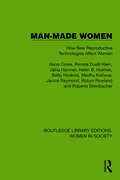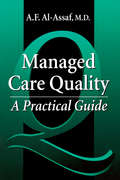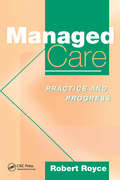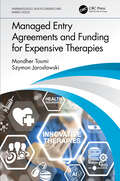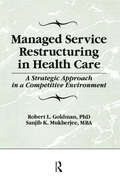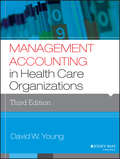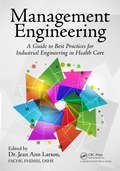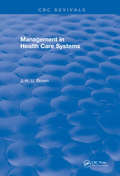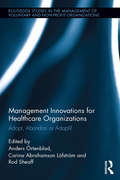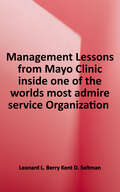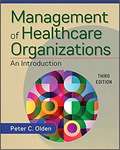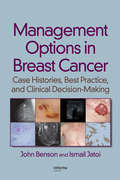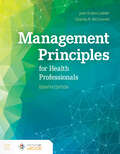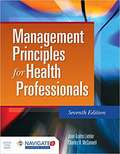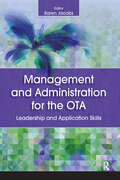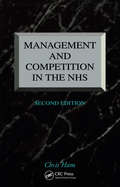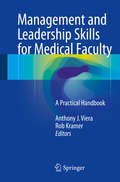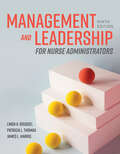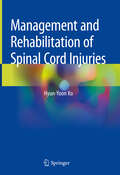- Table View
- List View
Man-Made Medicine: Women’s Health, Public Policy, and Reform
by Kary L. MossIf not for the reproductive functions of women, would there be anything called women's health care? A review of medical literature, practice, and policy in this country would suggest that the answer is no. Offering a startling view of the current state of health care for women in the United States and laying the foundation for a new, widely defined women's medicine, Man-Made Medicine makes an urgent statement about gender bias in the medical establishment and its pernicious effects on the well-being of women and the care they receive.These essays by physicians, lawyers, activists, and scholars present a rare interdisciplinary approach to a complex set of issues. Gender stereotyping and bias in the collection, analysis, and reporting of scientific data and in the ways health-related news is covered by the media are examined. The exclusion of women from the health care policy-making process and the effect such exclusion has on the determination of priorities among potential areas of research are also explored. With discussions of the plight of specific populations of women whose health care needs are not being sufficiently met--for example, immigrants, prisoners, the mentally ill, or women with HIV/AIDS, disabilities, or reproductive health problems--this book considers matters of race and class within the parameters of gender as it builds a fundamental challenge to the existing health care system. A range of current reform proposals are also evaluated in terms of their potential impact on women.Suggesting no less than a radical rethinking of women's medicine, Man-Made Medicine gives essential direction to the discussions that will shape the future of health care in this country. It will be of great interest to a wide audience, including health care advocates, policymakers, scholars, and readers generally concerned with women's health issues.Contributors. Ellen Barry, Laurie Beck, Joan Bertin, Janet Calvo, Wendy Chavkin, Kay Dickersin, Abigail English, Elizabeth Fee, Carol Gill, Nancy Krieger, Joyce McConnell, Judy Norsigian, Ann Scales, Susan Stefan, Lauren Schnaper, Catherine Teare
Man-Made Women: How New Reproductive Technologies Affect Women (Routledge Library Editions: Women in Society)
by Madhu Kishwar Janice Raymond Jalna Hanmer Robyn Rowland Helen B. Holmes Renate Duelli Klein Gena Corea Betty Hoskins Roberta SteinbacherIn the early 1980s the new reproductive technologies available supposedly offered infertile women a chance to have children. However, there was growing concern that the determination of scientists to dominate nature, their disregard for women’s well-being, and the financial gains to be made from these technologies would together result in the increased modification of all women’s lives and the loss of even more control over our own bodies.Originally published in 1985, the essays in Man-Made Women describe the technologies being used and researched in the areas of in vitro fertilization (’test-tube babies’), sex-predetermination and embryo transfer at the time. They discuss the practical application of the technologies on an international scale and draw attention to the racist and classist assumptions on which they are based. There is also information about the international action that feminists had begun to counter these so-called benevolent and therapeutic technologies.Man-Made Women hoped to encourage women to start questioning the ‘miracle’ of these new reproductive technologies and to become involved in crucial decisions about their bodies and their lives.
Manage Your Mood: How To Use
by Rob Willson David VealeOvercoming app now available via iTunes and the Google Play Store.Depression is one of the most common mental health problems and affects 121 million people at any time.It is recognised by the World Health Organisation as one of the Top 10 most disabling health conditions. Behavioural Activation, a therapy developed from CBT, is an effective new technique in managing depression and ideally suited to self-help. By analysing, challenging and changing behaviours such as avoidance, ruminating and excessive worrying, the sufferer can gradually reinforce their positive experiences and decrease the behaviour which reinforces their depression. Includes worksheets and practical problem-solving techniques.Step-by-step approach to analysing and changing behaviours.Includes an explanation of depression and associated behaviours and case studies.Written by leading clinicians in the field.
Managed Care Quality: A Practical Guide
by A. F. Al-Assaf R. Robyn AssafManaged care organizations are paving the way to the future of health care delivery in the United States and countries around the world. As managed care systems evolve, a major concern is quality. Managed Care Quality: A Practical Guide is a collection of applications and experiences gathered from practicing health professionals in the field of managed care. This first "how to" guide was written to help managed care organizations meet the common objective of ensuring the best quality of services and care. Managed Care Quality: A Practical Guide presents successive steps in implementing quality in health care organizations. It introduces the methods, skills, and practices involved in quality health care programs and offers solutions to problems typically encountered in managed care.
Managed Care Systems and Emerging Infections: Challenges and Opportunities for Strengthening Surveillance, Research, and Prevention Workshop Summary
by Institute of MedicineThis workshop summary report from the Institute of Medicine's Forum on Emerging Infections examines how the managed care revolution has created both problems and opportunities in the fight against infectious disease. It highlights ways in which managed care systems can: -- Aid research. -- Develop clinical guidelines. -- Manage the use of antibiotics. -- Support public education efforts. -- Monitor the spread of emerging infections and microbial resistance. It will be important to anyone involved in the battle to control and eradicate infectious diseases.
Managed Care: Neue Wege im Gesundheitsmanagement
by Volker Eric AmelungUnter Managed Care versteht man den Einsatz von Managementinstrumenten im Gesundheitswesen, die zumindest partielle Integration der Funktionen Leistungserstellung und Finanzierung sowie die Auswahl geeigneter Leistungserbringer. Das Buch stellt die Vielzahl unterschiedlicher Organisationsformen dar, wie beispielsweise integrierte Versorgungssysteme, und geht auf Instrumente wie Disease Management, Case Management, Evidence Based Medicine, HTA, DRGs, Bonus- und Malussysteme, Leitlinien und viele andere praxisrelevante Managementansätze ein. In aktuellen Fallstudien werden darüber hinaus erfolgreiche Konzepte aus den USA, Großbritannien und Deutschland vorgestellt. Für die 5. Auflage wurden die Fallstudien aktualisiert und erweitert.
Managed Care: Practice and Progress
by Michael Drury Merrill WhalenFirst Published in 2018. CRC Press is an imprint of Taylor & Francis, an Informa company.
Managed Entry Agreements and Funding for Expensive Therapies (Pharmaceuticals, Health Economics and Market Access)
by Mondher Toumi Szymon JarosławskiMarket entry agreements (MEA) for pharmaceuticals have become extremely popular and widespread geographically. Emerging countries that have not yet begun to introduce MEAs are now actively engaged in doing so. This book examines the concept of MEAs, detailing how depreciation of some specific regenerative therapies through intangible asset amortization is unavoidable. The authors provide a historical vision of the development of MEAs with experiences, failures, and successes that have shaped the evolution and place of MEAs in access to pharmaceuticals. They provide an extensive review of MEA typology and propose a new one that is pragmatic and actionable. FEATURES Discusses the affordability of future therapies and the possible challenges for health insurance systems Addresses the practical and applied issue of market access and includes the most up-to-date developments, such as the Pelosi bill Describes the potential paradigm change that will challenge all payers and may question the sustainability of our health care systems Highlights the gradual move from repeated treatment administration to a single administration with the potential for a definite cure Managed Entry Agreements and Funding for Expensive Therapies provides invaluable information to all stakeholders involved in market access and to students in the field.
Managed Service Restructuring in Health Care: A Strategic Approach in a Competitive Environment
by William Winston Robert L Goldman Sanjib K MukherjeeSurvival in the growing managed care environment requires the integration of financial analysis, market appraisal, and administrative management. The authors of Managed Service Restructuring in Health Care provide a unique tool for readers to enable them to make these successful management decisions in restructuring services. The unique approach in this book assists health care managers and prospective managers as they seek to solve the problem of how to deal with health care services that appear to be no longer productive. In Managed Service Restructuring in Health Care, the authors provide a solid theoretical base for what they have developed in MSR (Managed Service Restructuring)--a conscious--not crisis--management tool. They prepare readers for implementing MSR techniques by describing them in detail for their application to readers’situations. MSR approaches to planned health care management, as introduced in this book, help administrators channel scarce resources to the services the community wants and needs most. Facts and cases are offered as examples of when and how MSR techniques have been applied successfully. The authors also include failure cases where, if MSR techniques had been followed, health care providers would have survived in several communities.Incorporate the information in this book to enhance long-range planning and prevent closure of health care services needed by the community. Along with financial and marketing tools necessary for long-range planning, Goldman and Mukherjee list warning signals that alert professionals to the need to review the services and products offered. They also fully explore these areas: Product Life Cycle Boston Consulting Group’s Portfolio of Business (Growth Share Matrix) Product Development Product Planning Public Service of Health Care Providers Centers of Excellence Service Diversification/Consolidation Investment/Disinvestment Criteria Marketing in Competitive Environment for Health ServicesHealth care managers, hospital administrators, and students in health services management programs can benefit from the focus on conscious planning in Managed Service Restructuring in Health Care. While many of the examples take place within acute care hospitals, the MSR approach and this book are designed to assist any health care administrator or manager. With knowledge of when and how services can be prolonged, professionals can more effectively lead their health care provider into a more competitive environment. The analyses used in the book should enhance many readers’knowledge of basic marketing and financial principles and theories important to restructuring and providing health services today.
Management Accounting in Health Care Organizations
by David W. YoungA user-oriented approach to management accounting concepts and techniquesThis thoroughly revised new edition of Management Accounting in Health Care Organizations provides introductory-level instruction and a user-oriented approach to management accounting concepts and techniques that help prepare students for managerial work in health care. The new edition includes information regarding the role of management accounting in health care organizations, the impact of the Affordable Care Act on managerial responsibilities, recent changes in operational budgeting practices--including a focus on "budget drivers," the importance of managing the revenue cycle, and other factors that have fundamentally altered the use of management accounting in health care organizations over the past several years.Throughout this edition, the author introduces concepts and techniques that will help students identify, analyze, and apply key management accounting principles. The use of practice case studies at the end of each chapter allows students to master the techniques rather than simply memorize them.Assesses the impact of health care's impending fiscal crisis on the management accounting needs of health care organizationsDescribes the essentials of full-cost accounting, differential-cost accounting, and activity-based accounting, while illustrating their use in health care organizationsExplains responsibility accounting and provides guidance on designing a responsibility accounting structure
Management Engineering: A Guide to Best Practices for Industrial Engineering in Health Care
by Jean Ann LarsonIncreasing costs and higher utilization of resources make the role of process improvement more important than ever in the health care industry. Management Engineering: A Guide to Best Practices for Industrial Engineering in Health Care provides an overview of the practice of industrial engineering (management engineering) in the health care industr
Management Essentials for Doctors
by Vino Ramachandra Neville Robinson Rory Shaw Nuala LucasManagement skills and a sound knowledge of the NHS are mandatory for consultant and general practice careers. Management Essentials for Doctors is an invaluable resource for trainee doctors, hospital consultants and general practitioners, as well as a compendium of 'hot topics' for all doctors preparing for medical interviews. Written by doctors, for doctors, the 60 topics provide: * Clear descriptions of NHS structures, functions, policy and procedures * Detailed coverage of core management skills * An in-depth review of professional, governance, safety and quality issues Written in an easy-to-read style, with alphabetically listed themes for quick reference, Management Essentials for Doctors is not only an indispensable guide for busy clinicians, educational leads and medical managers but also a practical resource for interview preparation and career development.
Management In Health Care Systems (CRC Press Revivals)
by J. H. BrownHealth care system has suffered from poor management from the beginning, yet the traditional management text books offer little help by focusing on management for sales and profits which are totally foreign to the medical environment. The books usually deal with the business problems whereas the medical care system is a bureaucracy and should be understood as such. In this book, the author refocuses traditional management information in the form of material which will be of use to the medical community. There is no discussion of sales, markets, profit and loss, etc. in the traditional sense. Each discussion has been based on medical and hospital procedure and the activity of the health care system. The book looks closely on topics such as standards, controls, and feedback because these are subjects which are not often well-understood and which often make the difference between success and failure in management. The author has also treated the subject of planning in greater detail because this is such a vital element of the medical system. Because the same references often apply to many areas of discussion, the author has deliberately cited the reference once and provide an extensive bibliography of general references. Each reference is selected to deal with the topic in general rather than with individual ideas.
Management Innovations for Healthcare Organizations: Adopt, Abandon or Adapt? (Routledge Studies in the Management of Voluntary and Non-Profit Organizations)
by Anders Örtenblad, Carina Abrahamson Löfström and Rod SheaffInnovations in management are becoming more numerous and diverse, and are appearing in organizations providing many different kinds of products and services. The purpose of this book is to examine whether some widely-promoted examples of these management innovations – ranging from techniques such as Kaizen to styles of leadership and the management of learning – can usefully be applied to organizations which provide healthcare, and applied in different kinds of health systems. Management Innovations for Healthcare Organizations is distinctive in selecting a wide and diverse range and selection of managerial innovations to examine. No less distinctively, it makes an adaptive, critical scrutiny of these innovations. Neither evangelist nor nihilist, the book instead considers how these innovations might be adapted for the specific task of providing healthcare. Where evidence on these points is available, the book outlines that too. Consequently the book takes an international approach, with contributions from Europe, the Middle East, Australia and North America. Each contributor is an expert in the management innovation which they present. This combination of features makes the book unique.
Management Lessons From Mayo Clinic: Inside One of the World's Most Admired Service Organizations
by Leonard L. Berry Kent D. SeltmanThe leader's guide to building a service powerhouse using the approach that made Mayo Clinic the #1 healthcare system in America. Mayo Clinic is among the best service organizations in the world. It fosters a culture that exceeds customer expectations and earns deep loyalty from both customers and employees. This classic business guide offers a rare, up-close look at the best practices that drive Mayo Clinic's success. <p><p>By examining the operating principles that guide every management decision at this legendary institution, authors Leonard Berry and Kent Seltman: <p>• Demonstrate how a great service brand evolves from the core values that nourish and protect it <p>• Extrapolate instructive business lessons that apply outside healthcare <p>• Illustrate the benefits of pooling talent and encouraging teamwork <p>• Present a proven prescription for creating sustainable service excellence <p><p>Learn how to apply the Clinic's winning methods to your own organization: business concepts that produce stellar results, effective organizational efficiency, and world-class interpersonal service.
Management Of Healthcare Organizations: An Introduction
by Peter C. OldenManagement problems are complex and rarely fixed with a single, universal solution. Particularly in healthcare organizations, management is fluid, and the “right” approach depends on a variety of ever-changing factors. <p><p> Management of Healthcare Organizations: An Introduction provides an integrated, practical approach to management that is applicable to all kinds of healthcare organizations. The book prepares future managers and leaders to assess situations and develop solutions with confidence. <p> Author Peter C. Olden combines extensive real-world management experience with academic expertise to explain fundamental management theories, concepts, methods, and tools and how to apply them in healthcare organizations. Adopting a student-centered approach, he uses a fresh, engaging style and clear organization of content supported by many exhibits, sidebars, and an appealing design. Although primarily intended for undergraduate students interested in managing healthcare organizations, this book is also a valuable resource for allied health majors and practicing healthcare managers.
Management Options in Breast Cancer: Case Histories, Best Practice, and Clinical Decision-Making
by John Benson Ismail JatoiManagement Options in Breast Cancer is the only comprehensive resource devoted to exploring the systematic approach to breast cancer diagnosis, surgery, and postoperative care. This guide is an ideal tool for oncologists, pathologists, radiologists, and gynecologists seeking alternative management options for breast cancer. In addition, trainees wi
Management Principles for Health Professionals
by Charles R. McConnell Joan Gratto LieblerManagement Principles for Health Professionals is a practical guide for new or future practicing healthcare managers. The customary activities of the manager—planning, organizing, decision making, staffing, motivating, and budgeting—are succinctly defined, explained, and presented with detailed examples drawn from a variety of health care settings. Students will learn proven management concepts, techniques, models, and tools for managing individuals or teams with skill and ease. The Eighth Edition continues to present foundational principles of management in the context of contemporary health care. With timely coverage of such topics as medical cost sharing; use of robots; ER by appointment; increased use of observation units; renewed use of flextime staffing and scheduling; use of social media on the job, and more, this thoroughly updated text addresses the latest trends and issues that today's health care manager is likely to encounter.
Management Principles for Health Professionals
by Charles R. McConnell; Joan Gratto LieblerManagement Principles for Health Professionals is a practical guide for new or future practicing healthcare managers. The customary activities of the manager--planning, organizing, decision making, staffing, motivating, and budgeting--are succinctly defined, explained, and presented with detailed examples drawn from a variety of health care settings. Students will learn proven management concepts, techniques, models, and tools for managing individuals or teams with skill and ease. <p><p> The Seventh Edition continues to present foundational principles of management in the context of contemporary health care. This thorough update offers many new examples including corporate compliance, standards of conduct and mandatory reporting, eHealth, revenue cycle considerations, cultural competency and diversity training, comparative effectiveness reviews. The Seventh Edition also offers expanded coverage of material relating to HIPAA, the electronic health record/personal health record, due diligence reviews, and healthcare reform legislation.
Management and Administration for the OTA: Leadership and Application Skills
by Karen JacobsComprehensive skills in management, administration, and leadership are essential for occupational therapy assistants (OTA) in their daily interactions with their clients in various health care environments.Inside Management and Administration for the OTA: Leadership and Application Skills, Dr. Karen Jacobs has gathered an expert team of 11 contributors of clinicians, academicians, administrators, managers, and graduate students to address each of the ACOTE Standards with a focus on evidence-based literature and examples of the leadership and management skills needed as an OTA.What you will learn from Management and Administration for the OTA: Contexts and Health Care—the potential impact of policy issues as they relate to the practice of occupational therapy Leadership and Advocacy—two important roles that OTAs need to assume to be agents of change Credentialing—introduces the national requirements for credentialing and for licensure, certification or registration under state laws Reimbursement—the various reimbursement systems requirements that affect the practice of occupational therapy Marketing and Promoting—The role of the OTA to promote the distinct value of occupational therapy to the public, as well as other professionals, service providers, consumers, third-party payers, and regulatory bodies Documentation and Quality Improvement—to ensure the OTA provides the highest quality of occupational therapy services Supervision—to understand the important relationship between the OTA, the OT, and nonprofessional personnel Fieldwork—to understand the role, criteria, and components of the OTA in fieldwork education Communication Skills—define health literacy and discuss how to use this concept to better understand the client, the client’s health environment, and the client’s occupations and health activities Ethics—explore the components of ethics that impact the delivery of occupational therapy and the foundational skills and knowledge needed by the OTA to maintain high standards of responsible, ethical practice Scholarship and Scholarly Practice—assists the OTA with how to articulate the importance of how scholarly activities and the evidence-based literature contribute to the distinct value and advancement of occupational therapy The chapters of Management and Administration for the OTA: Leadership and Application Skills also includes 5 key vocabulary terms and their definitions, case examples relevant to the content, website resources, and multiple choice review questions. Included with the text are online supplemental materials for faculty use in the classroom.Straightforward, comprehensive, and user-friendly, Management and Administration for the OTA: Leadership and Application Skills will provide OTA students and clinicians with an essential resource for their future success.
Management and Administration for the OTA: Leadership and Management Skills
by Karen JacobsThis comprehensive resource is designed to equip occupational therapy assistant (OTA) students and new practitioners with the essential knowledge required for effective skills in management, administration, and leadership.Using the American Occupational Therapy Association’s Occupational Therapy Practice Framework: Domain and Process 4th edition (OTPF-4) and aligned to the latest Accreditation Council for Occupational Therapy Education (ACOTA) Standards, this second edition provides invaluable guidance around the key areas, including: How changes in policy can impact upon the practice of occupational therapy The importance of leadership and advocacy for being an agent of change National requirements for credentialing and for licensure, certification or registration under state laws. Reimbursement systems The role of the OTA in promoting the distinct value of occupational therapy to the public, as well as other professionals, service providers, consumers, third-party payers, and regulatory bodies Documentation and quality improvement to ensure the OTA provides the highest quality of service The relationship between the OTA, the occupational therapist, and nonprofessional personnel The role, criteria, and components of the OTA in fieldwork education Communication skills, particularly in relation to the concept of health literacy and how it can be used to better understand a client and their context How the OTA can maintain high standards of responsible, ethical practice The role of scholarship and scholarly practice in assisting the OTA to articulate the distinct value of the profession Including practical applications, case studies, and real-world examples throughout, and therefore encouraging the critical thinking and problem-solving skills that OTA’s need in the role, this second edition also includes new chapters on Cultural Humility, Emerging and Innovative Practice, and Quality Improvement. Each chapter showcases the unique insights from a range of clinicians, academicians, administrators, and managers, all ground in the latest evidence-based literature, research, theories, and best-practice in occupational therapy.Comprehensive and user-friendly, Management and Administration for the OTA is an essential text for any student or new practitioner.
Management and Competition in the NHS
by Chris HamThis second edition reviews recent reforms and the likely impact of future developments in management and competition in the NHS. In particular, it reflects the growing importance of primary care and the continuing debates about health care rationing. It concentrates on the realities and how they can be interpreted to help strategists, managers, clinicians, students and those supplying the NHS understand the mechanism of efficient health care delivery.
Management and Leadership Skills for Medical Faculty
by Anthony J. Viera Rob KramerRecognizing that medical faculty face differentquestions or issues in different stages of their careers, this handy, practical title offers acomprehensive roadmap and range of solutions to common challenges in thecomplex and changing Academic Medical Center (AMC). With critical insights andstrategies for both aspiring and seasoned academicians, this handbook offers aconcise guide for personal career development, executive skill acquisition, andleadership principles, providing actionable, targeted advice for facultyseeking help on a myriad of new issues and situations. Pressures in today's Academic Medical Centerinclude significant changes to the healthcare system, competition for researchfunding, transformation of medical education, and recruitment and retention ofthe ever-evolving workforce. This dynamic environment calls for razor-sharpleadership and management effectiveness to stay competitive. AMC faculty aspireto formal leadership roles for a variety of reasons: to set a new vision, tocreate change, or to affect policy and resource decisions. For others,weariness of past leadership styles or mistakes may catalyze wanting a chanceto set a different tone. In the end, promotional opportunities often come withgreat administrative and management responsibilities. Management and Leadership Skillsfor Medical Faculty: A Practical Handbook isa must-have resource for faculty in AMCs and anyone with a role in healthcareleadership.
Management and Leadership for Nurse Administrators
by James L. Harris Linda A. Roussel Patricia L. ThomasTo succeed as leaders of a diverse, multigenerational workforce, nurse managers and executives need to have both traditional management skills and a contemporary, creative mindset. Management and Leadership for Nurse Administrators, Ninth Edition provides a comprehensive overview of key management and administrative concepts critical to leading modern healthcare organizations and ensuring patient safety and quality care. With this text, students will be prepared to lead a workplace that is rapidly evolving due to technology, culture, and changes in the U.S. healthcare system. The Ninth Edition features a new Introduction with a review of the current trends and patterns in nursing leadership, along with expanded discussions of translational science focused on implementation and dissemination, workforce well-being, resiliency, work-life balance, healthy work environments, and more timely topics.
Management and Rehabilitation of Spinal Cord Injuries
by Hyun-Yoon KoThis comprehensive, up-to-date guide to the rehabilitation care of persons with spinal cord injuries and disorders draws on the ever-expanding scientific and clinical evidence base to provide clinicians with all the knowledge needed in order to make optimal management decisions during the acute, subacute, and chronic phases. A wealth of information is presented on the diverse medical consequences and complications encountered in these patients and on the appropriate rehabilitative measures in each circumstance. The coverage encompasses all forms of spinal cord injury and all affected organ systems. Readers will also find chapters on the basics of functional anatomy, neurological classification and evaluation, injuries specifically in children and the elderly, and psychological issues. The book will be an invaluable aid to assessment and medical care for physicians and other professional personnel in multiple specialties, including physiatrists, neurosurgeons, orthopedic surgeons, internists, critical care physicians, urologists, neurologists, psychologists, and social workers.

